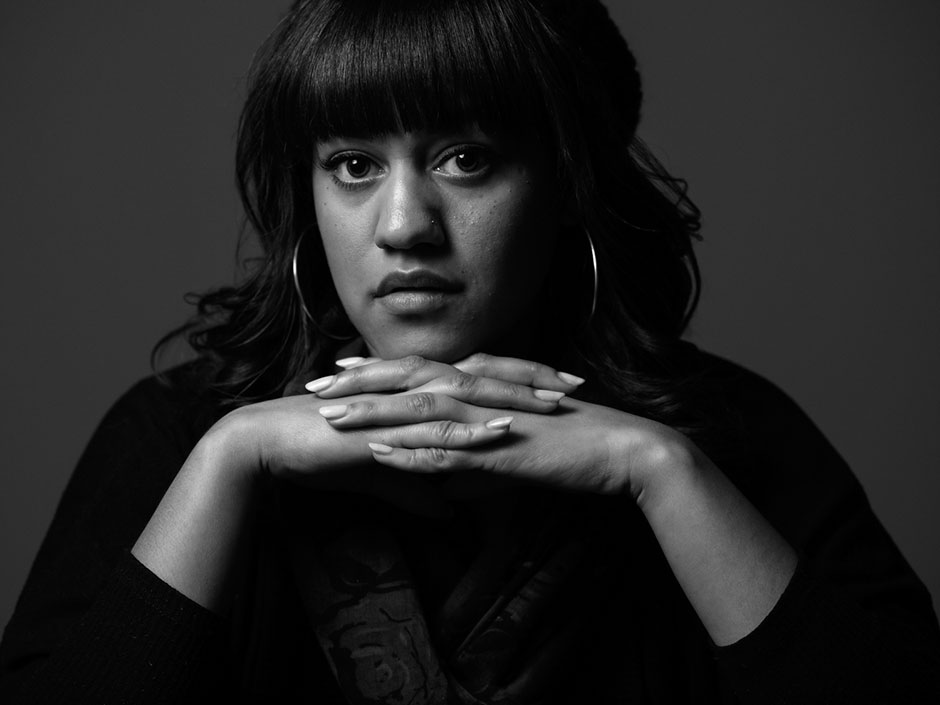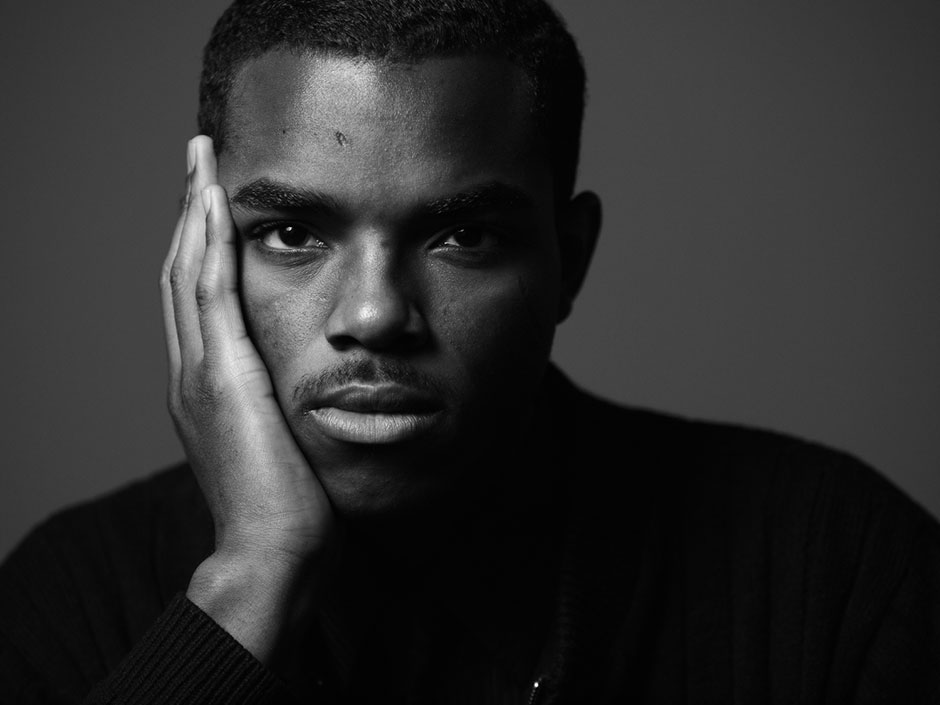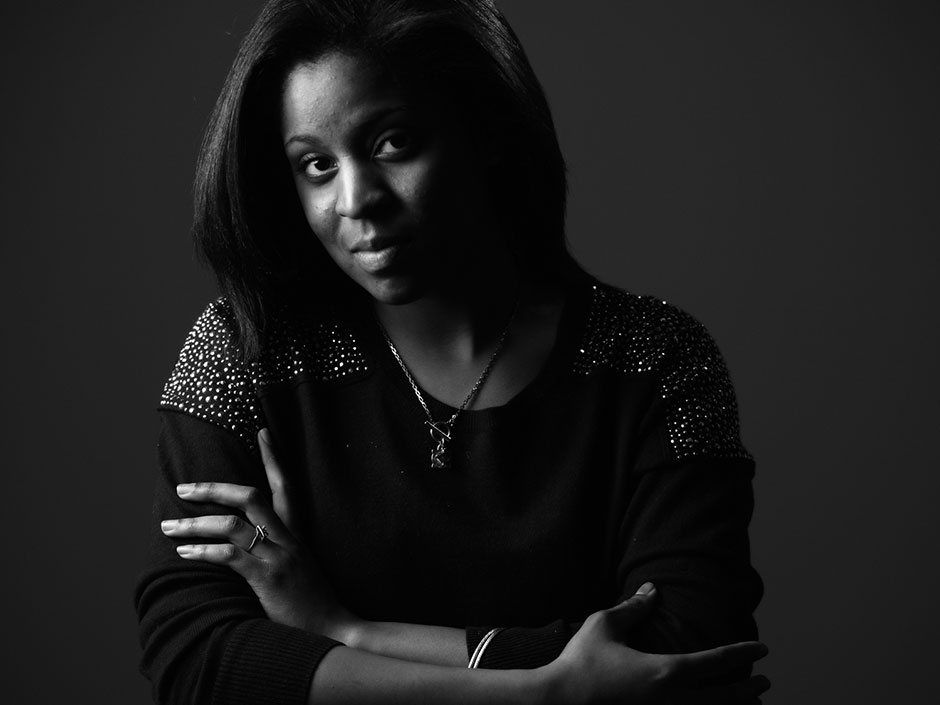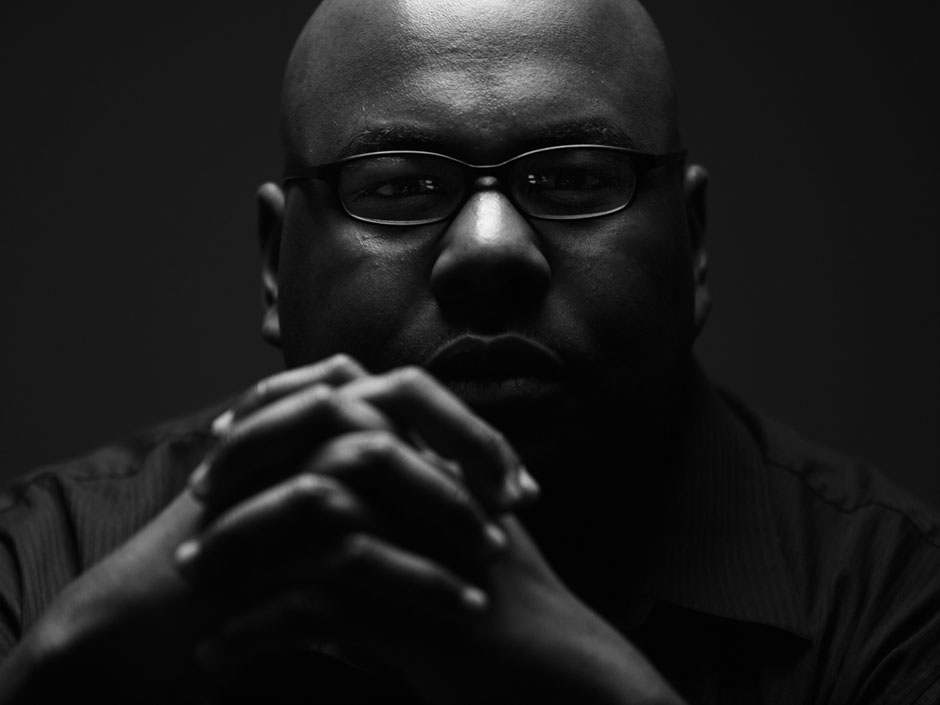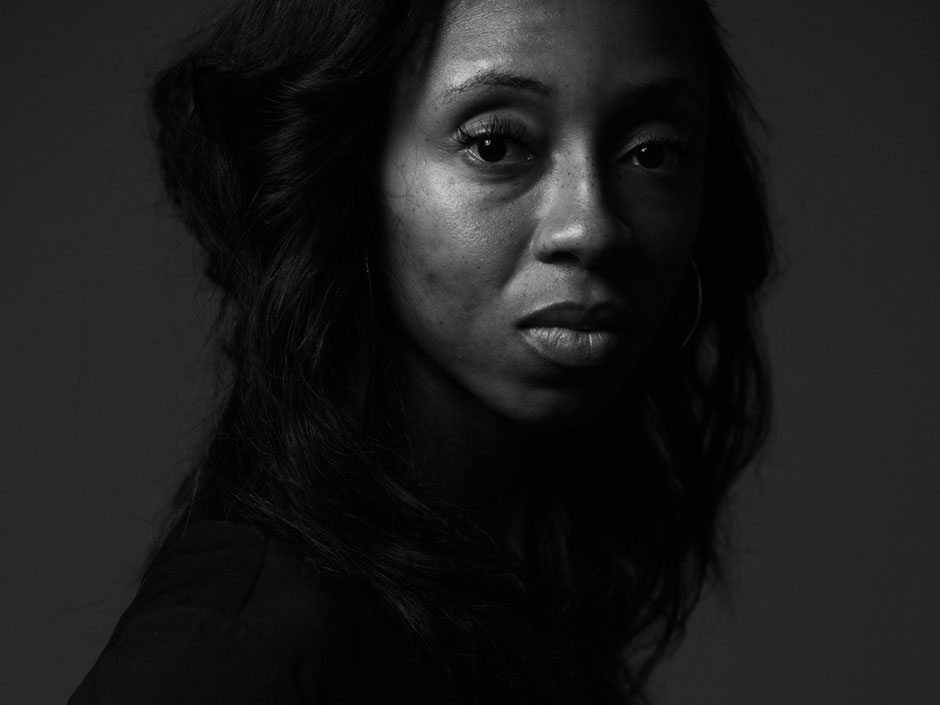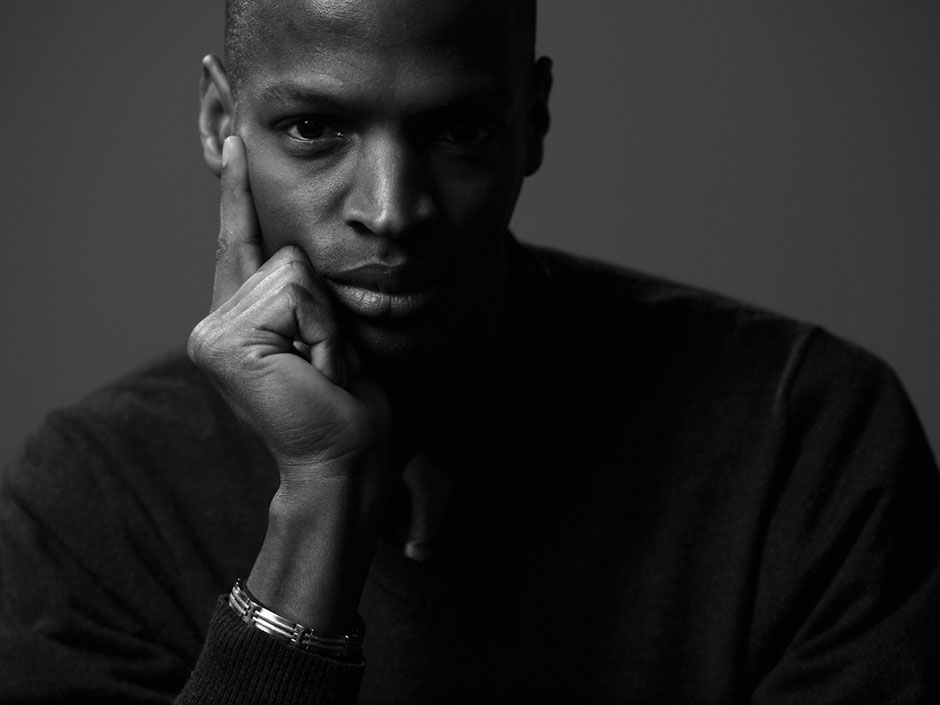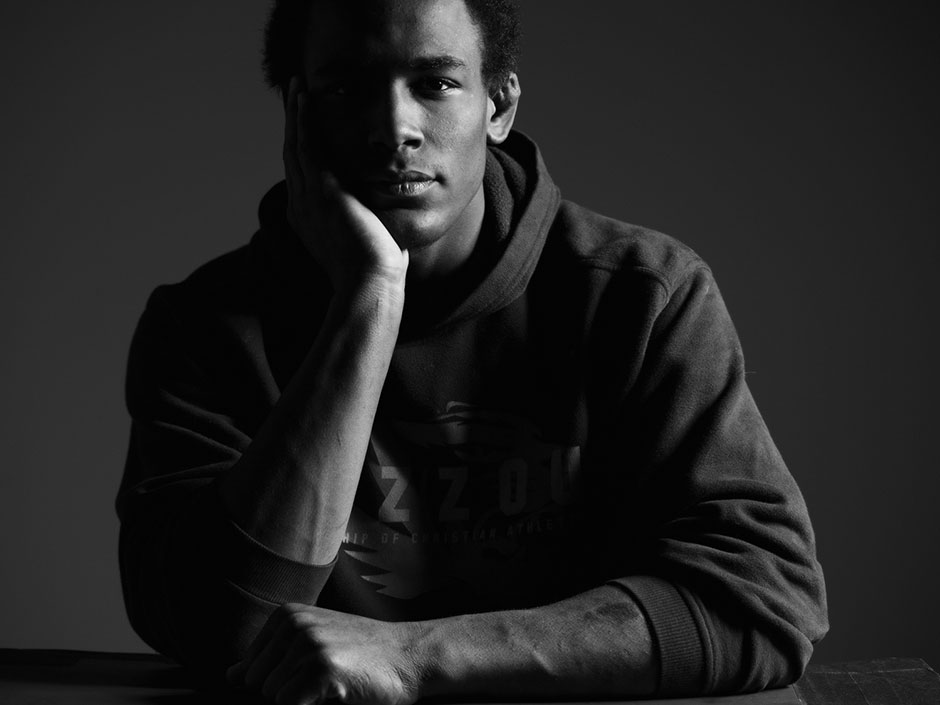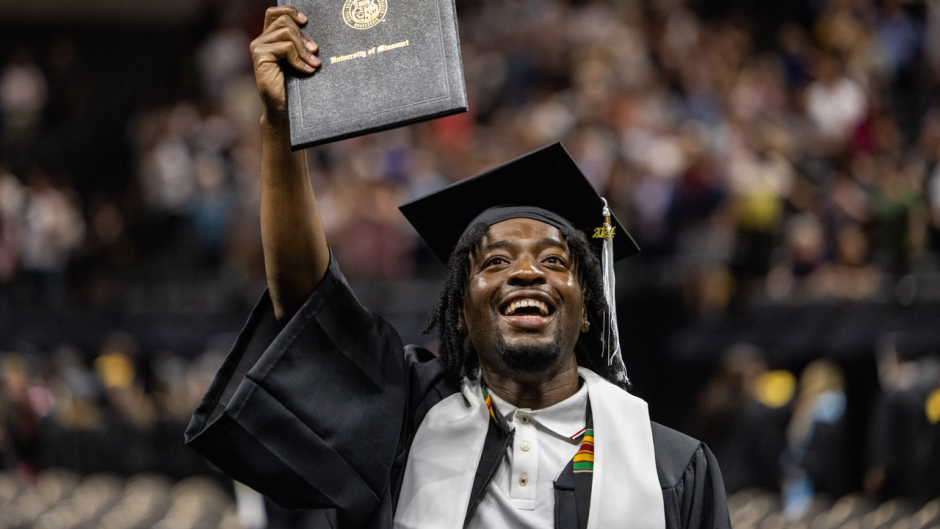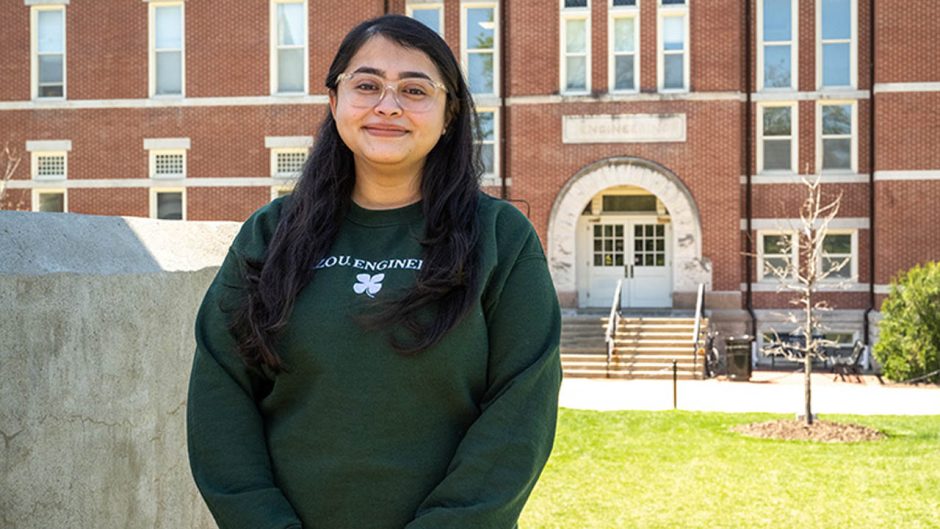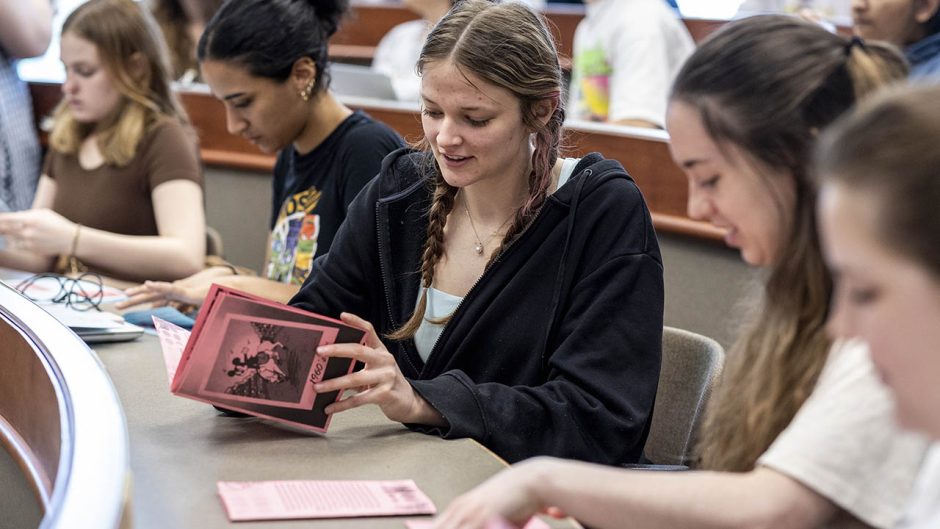
For the generation of African Americans born after the Civil Rights Movement, black identity is a complex concept affected by new opportunities, old struggles and a constantly shifting cultural landscape. Meet 10 Tigers who have achieved academic, professional, athletic and personal success, and hear what they have to say about what it means to be black in America in 2014.
Angela Haeny
What does it mean to be black in America?
Audio transcriptAngela Haeny, a graduate student from St. Cloud, Minn., is passionate about alcohol research. Many of Haeny's relatives have been negatively affected by — and some have died from — addiction to alcohol and other substances. “These experiences motivated me to pursue an advanced degree in hopes of better understanding substance-use disorders and to be able to help those who struggle with this problem,” Haeny says. Currently a fourth-year doctoral student studying clinical psychology, Haeny serves as the president of the Association of Black Graduate Professional Students (ABGPS). “This organization is important to me, and the reason why I wanted to serve as the president is because I want there to be a place for black students to come to talk about some of the struggles that they experience being at a predominantly white school — and to have the support that they need to be able to meet their academic and professional goals,” Haeny says. Haeny admires —and was named after — Angela Davis, a human-rights activist who worked closely with the Black Panther Party.
Payton Head
What does it mean to be black in America?
Audio transcriptPayton Head, a sophomore majoring in political science and international studies at MU, grew up in Chicago. When he was 11 years old, Head, his mother and his twin sister were illegally evicted from their house and became homeless — but still continued to help feed other homeless people. Since then, service to the community has been his top priority. He got involved in service programs in the Center for Leadership and Service. “I realized that my calling would be social justice," Head says. "It wasn’t just about serving the community in areas where you think the community needs help; it was about finding what people really wanted, what people really needed.” Head was involved with the Boys State and Boys Nation programs in high school and served as the president of the senate during his time at Boys State. “For me to be the one to have the opportunity to be looking the President in the eye and talking to him about my experience at Boys Nation and presenting him with the pin of the Boys’ Nation — that was the highlight of my life, honestly,” Head says. Head admires his mother, Candice Walker. “I always had books in the house,” Head says. “That’s something I really appreciate – her teaching me the value of an education.”
Alyssa Diggs
What does it mean to be black in America?
Audio transcriptAlyssa "Diggy" Diggs is the first Mizzou women's soccer player in the history of the program to earn a prestigious Mizzou '39 Award in recognition of outstanding academic achievement, leadership and service to the community. A native of Coppell, Texas, Diggs started playing soccer at age 5 and has been the most prolific player for MU in the last four years, with 17 goals and 12 assists in 77 games. "It has really developed my character and made me the person I am," she says of the sport. "I realized how much I can handle on my own." Diggs was one of the 11 MU soccer players recently placed on the 2013 Southeastern Conference Fall Honor Roll. She also made all-conference first team selections twice while playing in two different conferences: SEC in 2012 and the Big 12 in 2011. An Honors College student, Diggs majors in health sciences and minors in psychology. She plans to pursue nursing after she graduates in May. An admirer of pediatric neurosurgeon Benjamin Carson, she hopes to become a neonatal nurse.
Jessie Adolph
What does it mean to be black in America?
Audio transcriptJessie Adolph is "a father, a scholar and a poet." Adolph grew up in inner-city projects in St. Louis, Mo. His knack for poetry evolved from his love of hip-hop music, most notably the work of Public Enemy and Boogie Down Productions. "Hip-hop, in a sense, served as my surrogate father," Adolph says. "Because I grew up in a fatherless environment, I learned all of my cues — black masculinity and manhood — from the culture that I listened to." Adolph holds a master's degree in African American literature from Mizzou and is pursuing a doctorate in creative writing while serving as an interim English Department faculty member. "When I first got here, I think it was a bit of culture shock, for my students, to use hip-hop as a sort of means to teach them literature," Adolph says. "But you learn argumentation, you learn rhetoric, you learn counter-argument." He organizes poetry slams in and around Columbia to help young people to express themselves. "I just believe in giving people a platform where they can just spit their truth to the people," Adolph says. Adolph draws inspiration from Malcolm X's life. "Malcolm X was that wild card who defied the odds and still made a difference," Adolph says. "He will always be the leader that speaks out to me the most."
Fiona Asigbee
What does it mean to be black in America?
Audio transcriptFiona Asigbee was born in Manchester, England. She moved to her parents' native Ghana at age 6 and then spent her teen years in Iowa before moving to Columbia, where she earned bachelor's, master's and doctoral degrees from Mizzou. She is currently a project coordinator for Data Analysis and Analytics, working on improving effectiveness and efficiency in UM System units. As a student, Asigbee was a track star. She won the USATF indoor championship in pentathlon in 2007, was a two-time USATF bronze medalist in heptathlon in 2005 and 2006 and was ranked No. 4 in the nation in heptathlon the following year. A knee injury in 2008 and a car accident in 2012 derailed her Olympics aspirations, but she says her experiences in track helped shape her as a confident person. “The hardware or the trophies that you get from winning — they are just material things. What I really valued from being a track athlete was just the relationships that I made and the genuine people who really supported me and wanted to see me succeed,” Asigbee says. Agisbee admires Martin Luther King Jr. “What I learned from Martin Luther King is that no matter how bad things get or no matter how someone hurts you, you should never react in a way that is out of your character," she says.
Kristofferson Culmer
What does it mean to be black in America?
Audio transcriptKristofferson Culmer, a Mizzou doctoral student in computer science, was born and raised in the Bahamas. The third of eight children, he was named after the actor and musician Kris Kristofferson. Culmer’s mother, a teacher and businesswoman, died shortly after Culmer finished high school. Unable to afford further education, Culmer worked to support his family until a friend who’d graduated from college in the United States helped him train in track and earn a scholarship to attend Central Methodist University in Fayette, Mo. Culmer double-majored in computer science and business, ran track and cross-country, and served as vice president of his fraternity and president of student government. He then earned a master’s degree at Mizzou. Culmer was the first Tiger to serve three years as president of the MU Graduate Professional Council (GPC) and now serves as the director of outreach for the National Association of Graduate-Professional Students (NAGPS). "I'm concerned about the well-being of other students,” Culmer says. “If I feel strongly about something, I'm going to look for ways to fix it, remedy it, to make it better." Culmer admires Barack Obama, former Bahamas president Sir Lynden Pindling and his parents, Kendal and Ruthmae Culmer. "I learned the importance of taking care of family, standing up for your principles, and fighting for what you believe in from him,” Culmer says of his father. “I get my passion for education and self-improvement from my mother."
Maikieta Brantley
What does it mean to be black in America?
Audio transcriptMaikieta Brantley, an accountancy major from St. Louis, plans to graduate in May. She was crowned Miss Boone County in 2013 and competed in the Miss Missouri pageant. She won the title of Miss Audrain this year and plans to compete again at the Miss Missouri pageant later this year. In 2013 Brantley was the only black student to receive the Mizzou ’39 Award in recognition of outstanding academic achievement, leadership and service to the community. Brantley was inducted into the Mortar Board Honor Society last year and is involved with the nonprofit organization Dream Outside the Box, which provides extracurricular-activity opportunities for Columbia children. She has also been tutoring at the MU Leaning Center since her sophomore year. “I have a passion for education, and I enjoy having the opportunity to help my peers,” Brantley says. “I think the best thing about tutoring is hearing the joy in a student's voice when they tell me they passed an exam or received their highest grade to date.” Brantley says she admires Michelle Obama.
J’den Cox
What does it mean to be black in America?
Audio transcriptJ’den Cox, a Columbia native, has been wrestling since age 4. He finished his high school wrestling career with a 205-3 win-loss record, four state championships, a junior freestyle title in 2012 and a cadet Greco Roman title in 2011 in the world’s largest wrestling competition, the ASICS/Vaughan Junior and Cadet Nationals. Cox came to Mizzou in fall 2013 and is majoring is psychology. With only two losses out of 29 matches in the current season, he is ranked second nationally in the 197-pound category and plans to wrestle in the Olympics some day. “My plan is just to surround myself with people that believe in me and get me better and just to wrestle while loving every second of it,” Cox says. Cox admires Martin Luther King Jr. for advocating non-violence, for his role in the Civil Rights Movement and for his do-or-die attitude. “There’s going to be so many people around you that are going to be bashing on you and telling you that you can’t do something," Cox says. "If you believe in something so strongly, then you have to achieve it."
Jasmine Tilghman
What does it mean to be black in America?
Audio transcriptJasmine Tilghman, a doctoral student, describes herself as "an African American woman who was raised in a predominantly white community and attended predominantly white institutions all of her life." Growing up, Tilghman was involved in her church and sang in an a capella choir. Tilghman came to Mizzou to pursue psychology and also began to work closely with people who were passionate about music. "I really just fell in love with the whole process of constructing a song and recording it to have this final product,” Tilghman says. “It has always been something that I have wanted to do outside of psychology, and I will continue to pursue that after I graduate. My goal is to hopefully combine counseling psychology and music together so I can have the job of my dreams." Tilghman is currently working on her doctoral dissertation. Her multigenre first EP, Roomination, will be available on iTunes later this month; she wrote all the songs and performed the background vocals. Tilghman admires her mother, Jocelyn Tappin Tilghman. “She has raised me and my three other siblings, and I just hope that I can be as good of a mother as she is,” Tilghman says. “I want to be able to raise my black children to get PhDs and go conquer the world.”
Thomas Stovall
What does it mean to be black in America?
Audio transcriptThomas Stovall comes from a family “grounded and constituted in faith.” His grandfather, Dr. James Benton Stovall, who was both a pastor and a politician in Chicago, has been instrumental in shaping Stovall’s ideologies. “He did a great thing for me at a young age by being the blueprint of the man that I wanted to become,” Stovall says. Stovall majors in political science and minors in business management. As a freshman Stovall joined iGUIDE, a MU student organization that helps first-year students adapt to college through mentoring and counseling, and he later served as iGUIDE president. He was recently elected the President of the 4th Ward Young Democrats in Chicago. "I seek to be an optimistic person because I believe that bigger, better and brighter things are always on the horizon for whoever I come in contact with, and I seek to be that reminder to people," Stovall says. "I believe that we are all interrelated and we all need to motivate and push each other to get to the next level of our lives.” He admires Dr. Martin Luther King Jr. “His passion for what he was after was so great that it even made people who seemingly would never come together hold hands and march for one cause,” Stovall says.

